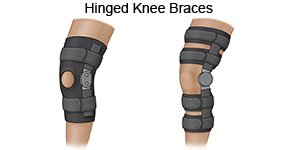Knee Pain
Medically reviewed by Drugs.com. Last updated on Sep 23, 2025.
AMBULATORY CARE:
Knee pain
may start suddenly, or it may be a long-term problem. You may have pain on the side, front, or back of your knee. You may have knee stiffness and swelling. You may hear popping sounds or feel like your knee is giving way or locking up as you walk. You may feel pain when you sit, stand, walk, or climb up and down stairs. Knee pain can be caused by conditions such as obesity, inflammation, or strains or tears in ligaments or tendons.
Seek care immediately if:
- Your pain is worse, even after treatment.
- You cannot bend or straighten your leg completely.
- The swelling around your knee does not go down even with treatment.
- Your knee is painful and hot to the touch.
Contact your healthcare provider if:
- You have questions or concerns about your condition or care.
Treatment
will depend on the cause of your pain. You may need any of the following:
- NSAIDs help decrease swelling and pain or fever. This medicine is available with or without a doctor's order. NSAIDs can cause stomach bleeding or kidney problems in certain people. If you take blood thinner medicine, always ask your healthcare provider if NSAIDs are safe for you. Always read the medicine label and follow directions.
- Acetaminophen decreases pain and fever. It is available without a doctor's order. Ask how much to take and how often to take it. Follow directions. Read the labels of all other medicines you are using to see if they also contain acetaminophen, or ask your doctor or pharmacist. Acetaminophen can cause liver damage if not taken correctly.
- Prescription pain medicine may be given. Ask your healthcare provider how to take this medicine safely. Some prescription pain medicines contain acetaminophen. Do not take other medicines that contain acetaminophen without talking to your healthcare provider. Too much acetaminophen may cause liver damage. Prescription pain medicine may cause constipation. Ask your healthcare provider how to prevent or treat constipation.
- Steroid injections may be given into your knee. Steroids reduce inflammation and pain.
- Surgery may be used for some injuries, such as to repair a torn ACL.
What you can do to manage your symptoms:
- Rest your knee so it can heal. Limit activities that increase your pain. Do low-impact exercises, such as walking or swimming.
- Apply ice to help reduce swelling and pain. Use an ice pack, or put crushed ice in a plastic bag. Cover it with a towel before you apply it to your knee. Apply ice for 15 to 20 minutes every hour, or as directed.
- Apply compression to help reduce swelling. Use a brace or bandage only as directed.
- Elevate your knee to help decrease pain and swelling. Elevate your knee while you are sitting or lying down. Prop your leg on pillows to keep your knee above the level of your heart.
- Prevent your knee from moving as directed. Your healthcare provider may put on a cast or splint. You may need to wear a leg brace to stabilize your knee. A leg brace can be adjusted to increase your range of motion as your knee heals.

What you can do to prevent knee pain:
- Maintain a healthy weight. Extra weight increases your risk for knee pain. Ask your healthcare provider how much you should weigh. He or she can help you create a safe weight loss plan if you need to lose weight.
- Exercise or train properly. Use the correct equipment for sports. Wear shoes that provide good support. Check your posture often as you exercise, play sports, or train for an event. This can help prevent stress and strain on your knees. Rest between sessions so you do not overwork your knees.
Follow up with your healthcare provider within 24 hours or as directed:
Write down your questions so you remember to ask them during your visits.
© Copyright Merative 2025 Information is for End User's use only and may not be sold, redistributed or otherwise used for commercial purposes.
The above information is an educational aid only. It is not intended as medical advice for individual conditions or treatments. Talk to your doctor, nurse or pharmacist before following any medical regimen to see if it is safe and effective for you.
Learn more about Knee Pain
Care guides
Further information
Always consult your healthcare provider to ensure the information displayed on this page applies to your personal circumstances.
